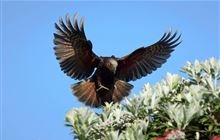Cruise ship visits Kāpiti Island
Archived content: This media release was accurate on the date of publication.
Introduction
Passengers from a cruise ship will be in for a treat today – pulling up alongside Kāpiti Island Nature Reserve.Date: 04 February 2019
DOC's Kāpiti Wellington District Operations Manager Jack Mace says it will be an unusual sight, but people can rest assured that the visit is allowed.
“It’s the first time in nearly 15 years a cruise ship has called in at Kāpiti Island. We are pleased to welcome these visitors in such a unique way and we will ensure the island’s biosecurity and the marine reserve’s integrity will not be compromised.”
The same ship was scheduled to visit on Christmas Day 2016, but bad weather delayed their schedule and the trip was cancelled.
“It’s business as usual for the island with visitor numbers within the island’s usual daily cap. The only difference is that these folk will travel to and from the island directly from their ship, rather than from Paraparaumu beach,” says Jack Mace.
The Caledonian Sky is a small (91 m) ship and will be anchored for the day near the north of the island, outside the marine reserve boundary. Safety considerations mean the vessel will not be travelling through Te Rau-o-te-rangi channel between the island and the mainland.
One of the island’s registered tour operators, Kāpiti Island Eco Experience, will escort 90 visitors off the ship to the island to enjoy the unique predator-free bird sanctuary.
Just 5 km from the coast, the island is one of the country’s most accessible nature reserves with rare birds such as kiwi, takahē and hihi.
“There are strict conditions of entry to protect the wildlife on this unique island. The cruise ship passengers must adhere to these conditions, including a biosecurity check, just like all other visitors do,” says Jack Mace.
Biosecurity checks will be carried out on board the main vessel by the tour operator’s staff, assisted by a DOC Conservation Dog handler and a rodent detection dog. These checks include thoroughly cleaning footwear and inspecting packs and pockets for stow-away seeds, soil, and invasive animals.
Jack Mace says, “This place is a real taonga – a unique example of the bird-land New Zealand once was – we are always keen to find ways to offer that experience to more people while always protecting its special values.”
DOC aims to connect more people with nature and hopes at least half of all international visitors will come to New Zealand to connect with our natural places by 2025.

